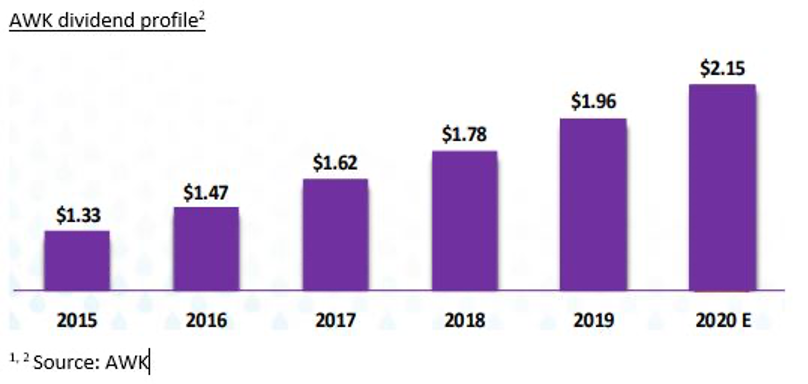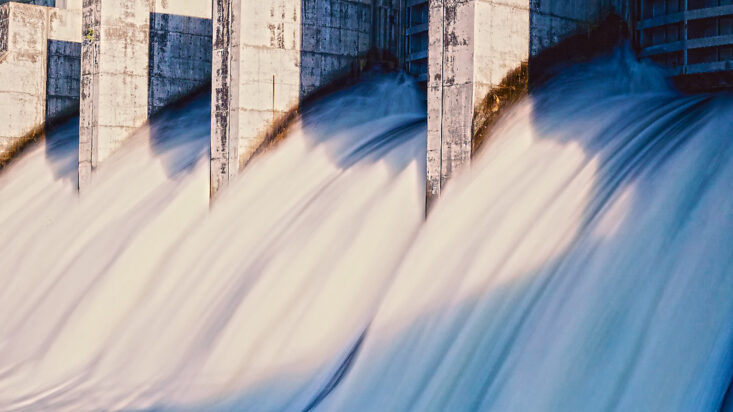Water utilities – dull but dependable?
I want to discuss a water utility, which may sound as dull as dishwater – but we global real assets investors have never been averse to safe, predictable, and yes, boring companies. The type of company that pays a dividend that is as dependable as a birthday cheque from Grandma. We have specialist in-house capability dedicated to researching and investing in global real assets (infrastructure and real estate), which we see as complementary assets for many investment portfolios.
The company for discussion is American Water Works (AWK), a US water utility that owns pipes that distribute potable (drinkable) water (it also has a smaller business in wastewater) across several US states (the largest exposures being Pennsylvania and New Jersey). The company is a natural monopoly (you would never see two water pipelines side by side competing with each other) and therefore customer bills are regulated by the various states’ public utility commissions.
A key point to note about AWK is that this year the company really has done its job as a safe investment. Amidst the Covid-19 crisis, AWK has been highly resilient, with only limited financial impact. As the company is fond of saying, people spending more time at home versus the workplace does not alter the aggregate number of toilet flushes. Despite this, AWK’s share price cratered with the market to U$97 in March, but is now up at US$144, compared to U$133 at the start of the year.
AWK’s business is largely indifferent to the economic cycle, with water consumption patterns fairly stable over time. Earnings and dividends are expected to grow by 7% to 10% compound annual growth rate (CAGR) to 20241. And uniquely this outlook is to a large extent indifferent to the depth and duration of the current recession, the US election outcome, or other macro-economic/geo-political factors. Further, there is limited risk of disruption on the horizon, and AWK has exemplary ESG credentials: the S&P Global Ratings ESG Evaluation scored AWK 87 out of 100, the highest evaluation score given by S&P in the US and the 2nd highest globally.

In reality, earnings are largely a product of how much capital investment has been made and the return on equity (ROE) that regulators allow AWK to earn. A basic tenet of corporate finance is that value is created where capital is deployed upon which an attractive return is earned. In the case of the water industry, investment needs are substantial, and ROEs are currently very healthy.
The need for capital investment is substantial in the water industry, due to ageing infrastructure in need of replacement. AWK has 51,000 miles of pipes and is currently on a 120-year replacement cycle (0.8% pa), which is relatively high compared to a 250-year cycle several years ago. AWK will replace 2,000 miles of pipelines from 2019 to 2023. At about U$4.1 million ($5.8 million) per replacement mile, replacing its entire network of pipes would cost about U$210 billion ($296 billion). Total capital expenditure over the next decade is expected to amount to $US20 billion-US$22 billion ($28.2 billion-$31 billion), and remain substantial thereafter well into the future. Furthermore, about 84% of the US’ highly fragmented 50,000 water systems (and 98% of wastewater systems) are owned by municipalities, with dilapidated infrastructure and replacement at much lower levels. The American Society of Civil Engineers graded the US’ water infrastructure a D in 2017, and found that in 2019 the national annual shortfall in total capital investment on water infrastructure was US$81 billion ($114 billion), which will have an impact on the extent of future shutdowns, flooding and leakages. It is a slow process, but AWK continues to make small ongoing acquisitions from muni owners, which is essentially another leg of capital investment opportunity for the company.
AWK currently earns an ROE on its US$9 billion ($12.7 billion) rate base of about 10%. This is high both in an absolute sense, and relative to the low-risk nature of AWK’s cashflows and the yield on US 10-year treasury bonds, of 0.65%. While allowed ROEs are lower than they were some years ago, there is a stickiness to ROEs which is largely attributable to the substantial capital investment requirements discussed above and competition between states to attract this capital. While ROEs are likely to fall somewhat from here, we expect AWK to continue to earn attractive returns for the foreseeable future.
In conclusion, it is the case for AWK that still waters run deep. The company has both the exemplary defensive characteristics that we look for in global real assets, as well as a very substantial and value-accretive growth outlook as it continues to heavily invest in its nation’s vital infrastructure.
Disclaimer: This blog has been prepared by Milford Australia Pty Ltd ABN 65 169 262 971 (AFSL 461253). You should not rely on any information in the blog in making any investment decision. It is for general information only and does not take into account your objectives, financial situation or needs. You should consider, with a financial adviser, whether the information is suitable for your circumstances. Past performance is not a guarantee of future performance. Disclosure of interest: Milford holds shares in AWK on behalf of its client.










